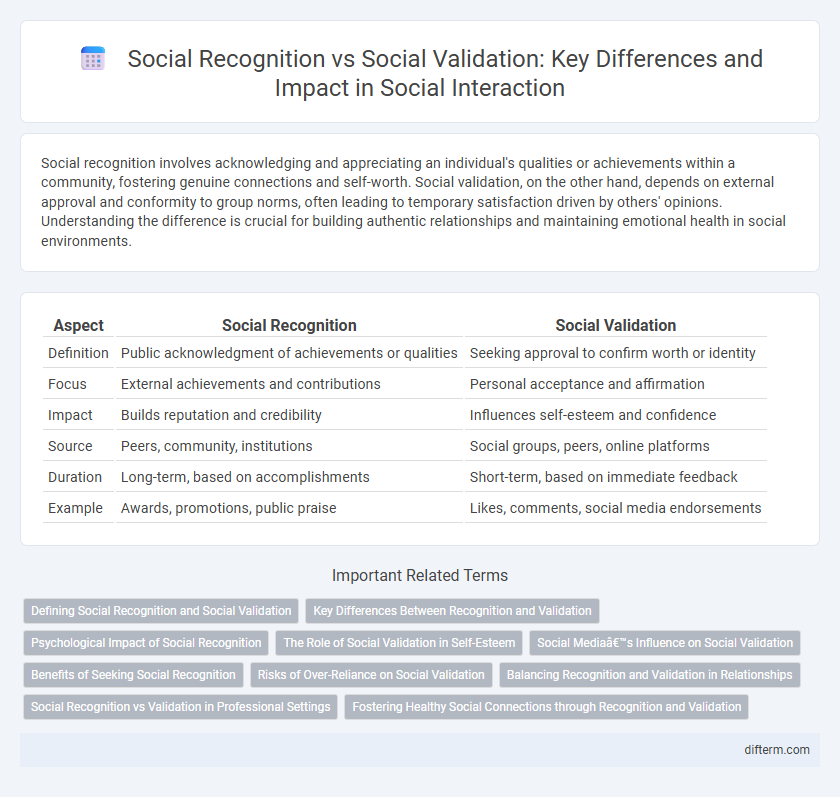Social recognition involves acknowledging and appreciating an individual's qualities or achievements within a community, fostering genuine connections and self-worth. Social validation, on the other hand, depends on external approval and conformity to group norms, often leading to temporary satisfaction driven by others' opinions. Understanding the difference is crucial for building authentic relationships and maintaining emotional health in social environments.
Table of Comparison
| Aspect | Social Recognition | Social Validation |
|---|---|---|
| Definition | Public acknowledgment of achievements or qualities | Seeking approval to confirm worth or identity |
| Focus | External achievements and contributions | Personal acceptance and affirmation |
| Impact | Builds reputation and credibility | Influences self-esteem and confidence |
| Source | Peers, community, institutions | Social groups, peers, online platforms |
| Duration | Long-term, based on accomplishments | Short-term, based on immediate feedback |
| Example | Awards, promotions, public praise | Likes, comments, social media endorsements |
Defining Social Recognition and Social Validation
Social recognition involves acknowledging an individual's achievements or qualities publicly, enhancing their sense of value within a community or organization. Social validation, on the other hand, is the process through which individuals seek approval or acceptance from others to confirm their beliefs, feelings, or actions as appropriate or acceptable. Both concepts play crucial roles in shaping social behavior and self-esteem but differ in their focus on external acknowledgment versus internal affirmation.
Key Differences Between Recognition and Validation
Social recognition involves acknowledging an individual's achievements or qualities by others, often publicly, which boosts self-esteem and social status. Social validation refers to the internal acceptance and affirmation of one's feelings or beliefs, providing emotional security and self-worth. Recognition is externally driven and tied to specific actions, whereas validation is internally experienced and linked to personal identity and emotional needs.
Psychological Impact of Social Recognition
Social recognition, distinct from social validation, fosters intrinsic motivation and enhances self-esteem by acknowledging individual achievements and efforts, which promotes psychological well-being. This positive reinforcement encourages a stronger sense of belonging and purpose within social groups, reducing feelings of isolation and anxiety. Research consistently shows that meaningful social recognition contributes to long-term mental health improvements and resilience against stress.
The Role of Social Validation in Self-Esteem
Social validation plays a crucial role in shaping self-esteem by providing external affirmation that reinforces an individual's sense of worth and belonging. Positive feedback and acceptance from peers enhance confidence and promote mental well-being, while the lack of validation may contribute to feelings of insecurity and social anxiety. Understanding the impact of social validation helps address psychological needs and fosters healthier interpersonal relationships.
Social Media’s Influence on Social Validation
Social media platforms amplify the pursuit of social validation by quantifying approval through likes, comments, and shares, which directly impact users' self-esteem and online behavior. Unlike social recognition, rooted in genuine respect and acknowledgment, social validation often hinges on external approval driven by algorithmic feedback loops. This emphasis on measurable social validation shapes content creation and interpersonal interactions, fostering a culture where online popularity equates to personal worth.
Benefits of Seeking Social Recognition
Seeking social recognition enhances self-esteem by affirming individual achievements and qualities through meaningful acknowledgment from others. It fosters a sense of belonging, strengthening interpersonal relationships and community ties. Social recognition also motivates continuous personal growth and professional development by providing constructive feedback and positive reinforcement.
Risks of Over-Reliance on Social Validation
Over-reliance on social validation can lead to decreased self-esteem and increased anxiety as individuals become dependent on external approval for their sense of worth. This dependence often results in conformity, stifling personal authenticity and creativity. Social validation's volatility may cause emotional instability, highlighting the importance of cultivating intrinsic motivation and social recognition rooted in genuine connections.
Balancing Recognition and Validation in Relationships
Balancing social recognition and social validation in relationships is crucial for fostering genuine connections and emotional well-being. Recognition involves acknowledging others' achievements and qualities, while validation affirms their feelings and experiences, creating a supportive environment. Prioritizing both fosters trust, reduces conflict, and promotes mutual respect within personal and professional relationships.
Social Recognition vs Validation in Professional Settings
Social recognition in professional settings involves acknowledging employees' achievements and contributions publicly, fostering motivation and a sense of belonging. Social validation focuses on confirming individuals' ideas or feelings are accepted by peers, which enhances confidence and decision-making. Recognizing efforts encourages engagement, while validation supports collaborative innovation and workplace harmony.
Fostering Healthy Social Connections through Recognition and Validation
Fostering healthy social connections involves balancing social recognition, which affirms individual achievements, with social validation, that acknowledges personal feelings and experiences. Social recognition boosts self-esteem by publicly appreciating accomplishments, while social validation strengthens emotional bonds through empathetic listening and acceptance. Integrating both elements creates a supportive environment where individuals feel valued and understood, enhancing overall social well-being.
social recognition vs social validation Infographic

 difterm.com
difterm.com